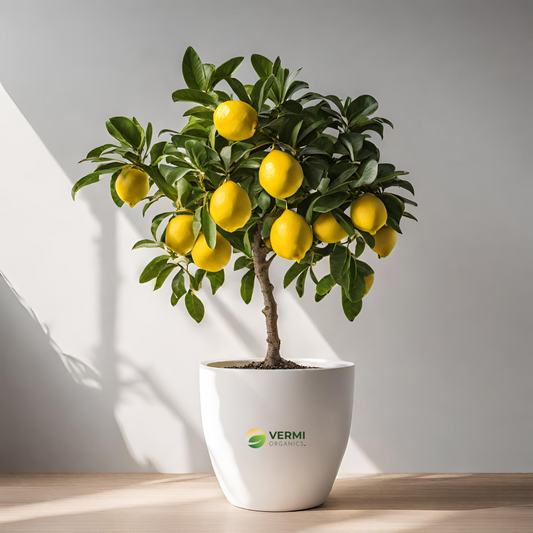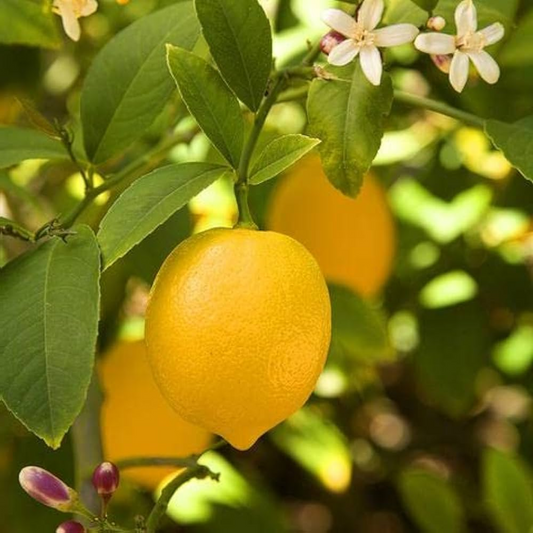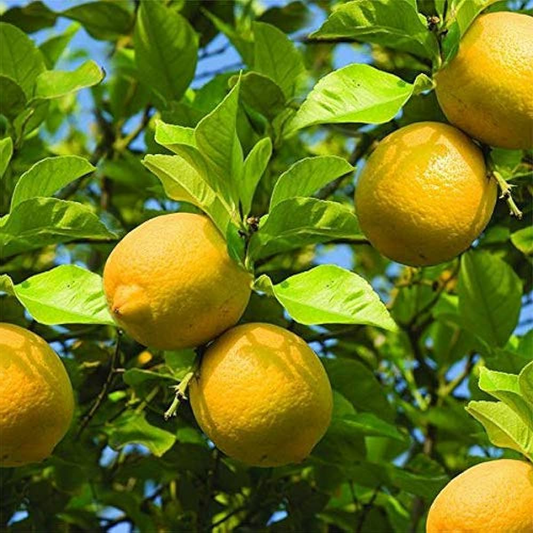Collection: Fruit Plants
-
Kagzi Nimboo, Lemon Tree - Plant
Regular price Rs. 499.00Regular priceUnit price / perRs. 599.00Sale price Rs. 499.00Sale -
Nimboo, Lemon Tree (Big Fruit, Grafted)- Plant
Regular price Rs. 399.00Regular priceUnit price / perRs. 799.00Sale price Rs. 399.00Sale -
Mango Tree (Alphonso, Grafted) - Plant
Regular price Rs. 399.00Regular priceUnit price / perRs. 799.00Sale price Rs. 399.00Sale -
Orange Fruit, Santra - Plant
Regular price Rs. 299.00Regular priceUnit price / perRs. 599.00Sale price Rs. 299.00Sale -
Mango Tree (Amrapali, Grafted) - Plant
Regular price Rs. 899.00Regular priceUnit price / perRs. 999.00Sale price Rs. 899.00Sale -
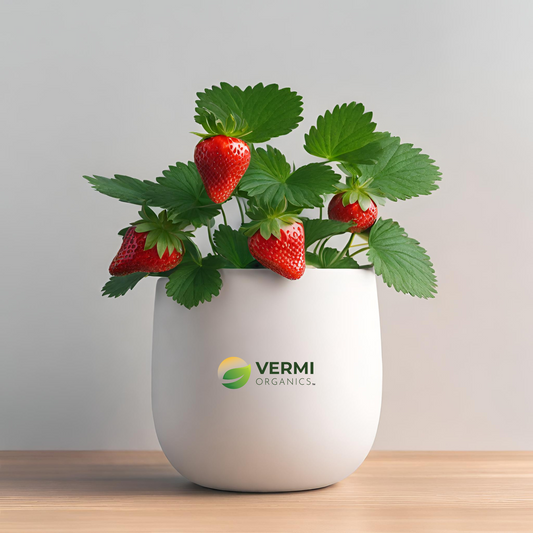
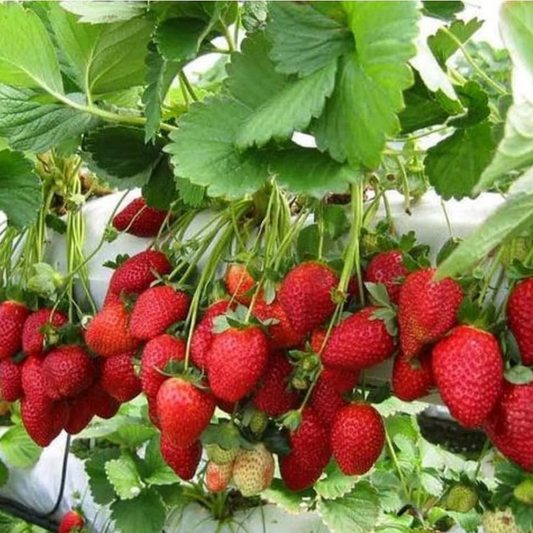 Sold out
Sold outStrawberry - Plant
Regular price Rs. 499.00Regular priceUnit price / perRs. 599.00Sale price Rs. 499.00Sold out -
Litchi Tree (Grown Through Seeds) - Plant
Regular price Rs. 399.00Regular priceUnit price / perRs. 799.00Sale price Rs. 399.00Sale -
Jamun, Tree for Rohini Nakshatra, Taurus or Vrishabha Rashi - Plant
Regular price Rs. 399.00Regular priceUnit price / perRs. 599.00Sale price Rs. 399.00Sale -
Nimboo, Lemon Tree - Plant
Regular price Rs. 399.00Regular priceUnit price / perRs. 899.00Sale price Rs. 399.00Sale -
Mango Tree (Badami, Grafted) - Plant
Regular price Rs. 399.00Regular priceUnit price / perRs. 599.00Sale price Rs. 399.00Sale -
Sitaphal, Annona squamosa (Grafted) - Plant
Regular price Rs. 399.00Regular priceUnit price / perRs. 599.00Sale price Rs. 399.00Sale -

 Sold out
Sold outBlueberry Plant
Regular price Rs. 499.00Regular priceUnit price / perRs. 599.00Sale price Rs. 499.00Sold out -
Mango Tree (Kesar, Grafted) - Plant
Regular price Rs. 399.00Regular priceUnit price / perRs. 599.00Sale price Rs. 399.00Sale -
Dead Rat Tree, Adansonia Digitata
Regular price Rs. 699.00Regular priceUnit price / perRs. 759.00Sale price Rs. 699.00Sale -
Red Guava, Amrud, Psidium guajava - Plant
Regular price Rs. 399.00Regular priceUnit price / perRs. 599.00Sale price Rs. 399.00Sale -
Guava Tree, Amrud, Psidium guajava (Grafted) - Plant
Regular price Rs. 399.00Regular priceUnit price / perRs. 599.00Sale price Rs. 399.00Sale -
Mango Tree (Sindhu, Grafted, Seedless) - Plant
Regular price Rs. 899.00Regular priceUnit price / perRs. 999.00Sale price Rs. 899.00Sale -
Mango Tree (Mallika, Grafted) - Plant 3 Feet Long
Regular price Rs. 499.00Regular priceUnit price / perRs. 599.00Sale price Rs. 499.00Sale -
Jamun Tree, Syzygium cumini - Plant
Regular price Rs. 399.00Regular priceUnit price / perRs. 550.00Sale price Rs. 399.00Sale -
Mango Tree (Pairi, Grafted) - Plant
Regular price Rs. 399.00Regular priceUnit price / perRs. 799.00Sale price Rs. 399.00Sale
Fruit Plants
Embarking on the journey of exploring fruit plants is akin to entering a vibrant world teeming with diversity and delight. In this exploration, we delve deeper into the intricate nuances and lesser-known facets that make fruit plants a captivating addition to any landscape.
The Fascinating World of Fruit Diversity:
Fruit plants encapsulate an astonishing variety of flavors, textures, and nutritional profiles. From the crispness of apples to the tropical sweetness of mangoes, each fruit harbors a distinct essence that tantalizes the senses. Understanding this diversity not only broadens our culinary experiences but also enriches our understanding of nature's intricacies.
The Wonders of Pollination and Fruiting:
Beyond their visual and gustatory appeal, fruit plants play a pivotal role in the ecosystem through pollination and fruiting. Bees, butterflies, and other pollinators dance from flower to flower, facilitating the essential process of pollination that transforms blooms into succulent fruits. Witnessing this transformation is a testament to nature's remarkable orchestration and the interconnectedness of life.
Fruit Plants and Environmental Benefits:
The presence of fruit plants in gardens and landscapes goes beyond mere aesthetics. They contribute significantly to environmental conservation by providing habitats for wildlife, improving air quality, and enhancing biodiversity. Their role in carbon sequestration and soil health underscores their importance in sustainable landscaping practices.
Seasonal Rhythms and Harvest Cycles:
Exploring fruit plants introduces us to the enchanting rhythm of seasons and harvest cycles. From the anticipation of blossoms heralding the arrival of spring to the joyous bounty of summer harvests, each season brings its own charm and rewards. Understanding the optimal seasons for planting, nurturing, and harvesting enhances the gardening experience and ensures a fruitful yield.
Cultural Significance and Symbolism:
Across cultures and civilizations, fruit plants have held symbolic significance and cultural relevance. They are often associated with fertility, abundance, and prosperity, making them integral elements in ceremonies, traditions, and rituals. Delving into the cultural narratives surrounding fruit plants unveils stories woven into the fabric of humanity's heritage.
The Art of Preserving and Enjoying Fruits:
The harvest season marks a time of abundance, presenting opportunities to savor fruits fresh from the garden. However, preserving these treasures through methods like canning, freezing, or drying allows us to extend the enjoyment beyond the harvest season. Exploring various preservation techniques ensures that the flavors of summer linger throughout the year.
Innovations in Fruit Plant Cultivation:
Advancements in horticulture and agriculture continually shape the world of fruit plant cultivation. From hybridization techniques to sustainable farming practices, innovations aim to enhance crop resilience, improve yields, and mitigate environmental impact. Exploring these innovations offers insights into the evolving landscape of fruit cultivation.
Cultivating Community through Fruit Plants:
Fruit plants have the unique ability to foster community engagement and social connections. Community gardens, orchards, and shared spaces centered around fruit cultivation create avenues for collaboration, education, and collective nurturing of green spaces. They serve as hubs for knowledge exchange and camaraderie among enthusiasts.
Exploring Global Varieties and Unique Finds:
Venturing into the world of fruit plants unveils a treasure trove of global varieties and unique cultivars. From heirloom varieties with rich histories to rare and exotic finds, the diversity extends far beyond the familiar fruits found in local markets. Discovering these lesser-known gems opens avenues for experimentation and cultivates an appreciation for diverse flavors.
Fruit Plants and Wellness:
Beyond their gustatory pleasures, fruits contribute significantly to our overall well-being. Packed with vitamins, antioxidants, and dietary fiber, they form an integral part of a healthy diet. Exploring the health benefits associated with consuming a variety of fruits underscores their role in promoting wellness.
Embarking on the exploration of fruit plants unravels a tapestry woven with nature's marvels, cultural significance, environmental stewardship, and culinary delights. Their multifaceted nature extends far beyond their physical presence, offering a gateway to understanding the intricate interplay between humans and the natural world.
Welcome to Vermi Organics, where the beauty of nature meets your garden. Our passion lies in fostering lush, fruitful landscapes that enrich lives and spaces. Within our curated selection, discover an array of exquisite fruit plants that promise not just harvests, but a delightful journey of growth and abundance.
The Importance of Fruit Plants in Your Garden:
Fruit plants are more than just greenery; they're the bearers of nature's sweetness. Beyond their aesthetic appeal, these plants offer a bounty of flavors, colors, and nutrients. From the zesty tang of citrus to the succulent sweetness of berries, each fruit plant brings unique tastes and health benefits to your home.
Our Commitment to Quality:
At Vermi Organics, quality is non-negotiable. We meticulously select and nurture our fruit plants to ensure they reach you in their healthiest state. Our plants are organically grown, free from harmful chemicals, and cultivated with the utmost care. Rest assured, every plant embodies our commitment to sustainability and excellence.
Explore Our Diverse Collection:
Dive into our extensive collection of fruit plants, carefully curated to suit various climates and preferences. Whether you're an avid gardener or a novice enthusiast, there's something for everyone:
- Citrus Delights: Experience the vibrant allure of citrus fruits with our range of lemon, lime, orange, and grapefruit plants. These aromatic trees not only add charm to your garden but also provide an endless supply of vitamin C-rich fruits.
- Berry Bonanza: Indulge in the sweetness of nature with our assortment of berry plants. From plump strawberries to juicy blueberries, these low-maintenance plants are perfect for pots or garden beds.
- Tropical Temptations: Transport yourself to a tropical paradise with our exotic fruit plants. Grow pineapples, papayas, or passion fruit and savor the taste of the tropics in your backyard.
- Orchard Classics: Embrace tradition with our selection of apple, pear, and peach trees. These timeless favorites bear delicious fruits while adding a touch of nostalgia to your landscape.
Expert Tips for Growing Fruit Plants:
Cultivating fruit plants is a rewarding endeavor, and we're here to guide you every step of the way. Here are some expert tips to ensure your fruit plants thrive:
- Soil and Watering: Provide well-draining soil and adequate watering to maintain optimal plant health.
- Sunlight: Most fruit plants thrive in full sunlight. Ensure they receive ample sunlight for fruitful growth.
- Pruning and Care: Regular pruning and care are essential to encourage healthy fruit production and maintain plant vigor.
Customer Satisfaction Guaranteed:
Your satisfaction is our priority. We are dedicated to providing not just exceptional products but also an unparalleled customer experience. Should you have any queries or concerns, our knowledgeable team is always here to assist you.
Conclusion:
Elevate your garden with Vermi Organics' exquisite fruit plants. Immerse yourself in a world of flavors, colors, and natural goodness. Whether you're a gardening enthusiast or a nature lover, our collection awaits, ready to transform your space into a fruitful haven.
FAQ's
What are the best fruit plants for beginners?
Easy-to-grow options for beginners include strawberries, blueberries, and dwarf citrus trees like lemons or kumquats.
How much sunlight do fruit plants need?
Most fruit plants thrive in full sunlight, requiring at least 6-8 hours of direct sunlight daily for optimal growth and fruit production.
When is the best time to plant fruit trees?
Plant fruit trees in the early spring or late fall when the weather is cool, allowing roots to establish before extreme temperatures.
How often should I water my fruit plants?
Regular watering is essential, especially during the growing season. Provide deep watering 1-2 times per week, ensuring the soil remains moist but not waterlogged.
Can fruit plants be grown in containers?
Yes, many fruit plants can thrive in containers, especially dwarf varieties. Ensure proper drainage and adequate space for root growth.
What soil type is best for fruit plants?
Well-draining, nutrient-rich soil with a slightly acidic to neutral pH level (around 6.0-7.0) is ideal for most fruit plants.
How long does it take for fruit plants to bear fruit?
The time to fruiting varies among different plants. Some may produce fruits within a year, while others might take several years to mature.
What are some common pests and diseases affecting fruit plants?
Aphids, fruit flies, and powdery mildew are common pests and diseases that can affect fruit plants. Regular inspection and proper care can help prevent infestations.
How do I fertilize fruit plants?
Use a balanced fertilizer formulated for fruit-bearing plants. Apply in the early spring before new growth begins and follow the recommended dosage.
Do fruit plants require pruning?
Yes, regular pruning helps maintain plant shape, remove dead or diseased branches, and encourage healthy fruit production.
How do I protect fruit plants from frost damage?
Use protective coverings like frost cloth or mulch around the base of plants and consider relocating potted plants indoors during frosty weather.
Can I grow fruit plants indoors?
Yes, certain fruit plants like citrus trees and figs can thrive indoors if provided with adequate sunlight and care.
How can I encourage fruit plants to flower and fruit more?
Ensure proper care with adequate sunlight, watering, fertilization, and pruning. Some plants benefit from hand pollination to boost fruiting.
Are all fruit plants self-pollinating?
No, some fruit plants, like certain apple or pear varieties, require cross-pollination from another compatible variety for fruit production.
What's the difference between determinate and indeterminate fruit plants?
Determinate plants produce a set crop at once, while indeterminate plants continue to bear fruit throughout the growing season.
Can I grow fruit plants in small spaces like balconies or patios?
Absolutely, many fruit plants, especially dwarf varieties, can thrive in containers and small spaces with proper care and sunlight.
How can I tell when fruits are ripe and ready to harvest?
Ripe fruits often exhibit changes in color, firmness, and aroma. Specific signs vary among different fruit types.
How do I prevent birds from eating my fruits?
Use netting or reflective tape around plants to deter birds. Hanging decoys or scare devices may also help protect the fruits.
Are organic methods effective in caring for fruit plants?
Yes, organic practices like composting, natural pest repellents, and avoiding chemical fertilizers can effectively care for fruit plants.
Can I grow fruit plants from seeds?
Yes, but some fruit plants may not produce fruits true to the parent plant when grown from seeds. It's often more reliable to start with nursery-bought plants.
How do I transplant fruit plants successfully?
Transplant during the dormant season, ensure proper root ball preparation, and provide adequate water and care post-transplant.
Are there any companion plants that benefit fruit plants?
Certain plants like marigolds, basil, or nasturtiums can repel pests and attract beneficial insects, benefiting fruit plants when grown nearby.
Can I grow fruit plants in regions with harsh winters?
Choose cold-hardy varieties suitable for your region, and consider protective measures like mulching to help fruit plants survive harsh winters.
What should I do if my fruit plant isn’t producing fruit?
Assess factors like inadequate sunlight, improper pruning, or lack of pollination. Addressing these issues can stimulate fruit production.
How do I rejuvenate an older, less productive fruit plant?
Prune away dead or overgrown branches, apply appropriate fertilizer, and ensure proper care to revive older fruit plants.

